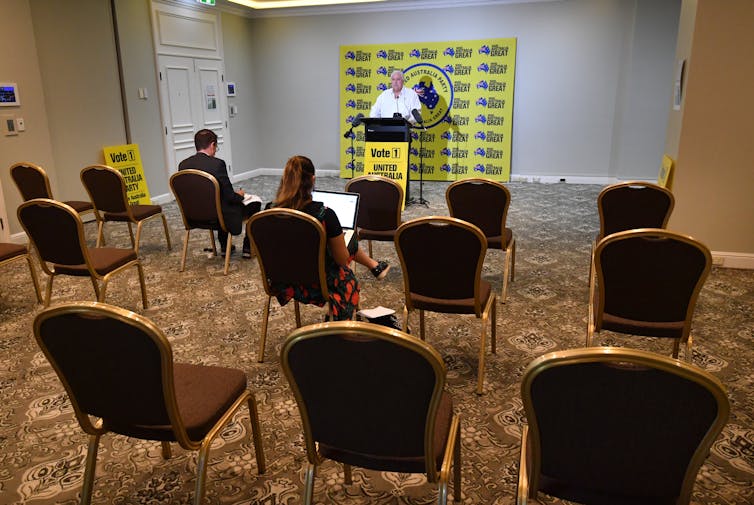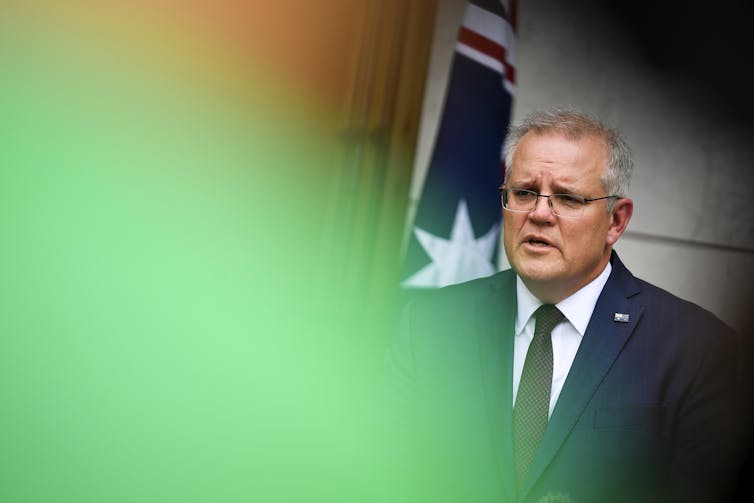Is it curtains for Clive? What COVID means for populism in Australia
- Written by Gregory Melleuish, Professor, School of Humanities and Social Inquiry, University of Wollongong
What can we make of Clive Palmer?
This week, he announced his United Australia Party (UAP) would not[1] contest the upcoming West Australian state election on March 13.
After a dismal showing[2] in the October 2019 Queensland poll, where does this leave his political prospects?
Palmer is no mini-Trump
Given Palmer’s love of publicity stunts and populist policies[3], one might be tempted to see him as a miniature, Antipodean Donald Trump[4] — but that would be misleading.
Trump was able to garner massive support[5] in segments of the American population, whereas Palmer’s UAP only managed 3.43% of first preference votes[6] in the lower house at the 2019 federal election.
American-style populism does not resonate with large numbers of Australians. Australian political traditions are quite different to those of America especially in terms of welfare and health provision. Those who seek to take the populist route find it a hard road.
 Donald Trump won more than 70 million votes at the recent US presidential election.
John Minchillo/AP/AAP
Donald Trump won more than 70 million votes at the recent US presidential election.
John Minchillo/AP/AAP
In the 2019 election One Nation and United Australia combined only managed to win 7.76% of the Senate vote[7].
Given the small base on which the likes of Palmer and One Nation’s Pauline Hanson have to work, one wonders what they now hope to achieve.
Australia’s populism culture
The current situation with COVID-19 might provide a clue as to why they have failed to spark a populist surge in Australia.
Palmer’s major contribution to the COVID world was his unsuccessful High Court challenge[8] to force Western Australia to open its borders.
The last 12 months has demonstrated the significance of “quarantine culture” in Australia, a term first coined by cultural historian John Williams[9] in the 1990s.
The natural instinct of Australians is to close borders against outside threats, be they national or state. The only partial exception to this rule at the moment is New South Wales[10] — the one part of Australia that had a vigorous free trade (or internationalist) political culture in the 19th century.
Read more: WA border challenge: why states, not courts, need to make the hard calls during health emergencies[11]
In late 19th century and early 20th century Australia, writers such as WG Spence and magazines like The Bulletin talked about a desire to “protect” Australia against a harsh outside world and, if possible, limit the operation of international finance. The ideal was an Australia not dependent on the rest of the world.
In this regard, it is also worth recalling that one of the arguments often given for restricting Chinese immigration at the time was they were seen as carrying diseases[12] into Australia.
Read more: What Clive Palmer must now ask himself: would China's 'bastards' buy a mine from him?[13]
This was a form of populism — but one quite different to the American version. It sought to protect Australia and Australians from the outside world, not to assert their right to liberty.
The COVID pandemic seems to have reignited this desire to protect Australians from an outside threat. The most remarkable aspect of this development has been the way in which this desire for protection has devolved to the state level.
Moves to close borders and institute quite draconian measures to halt the spread of the virus have been generally popular[14]. Australians, it would seem, are more interested in being protected than they are in asserting their rights to do as they please.
What does this mean for Palmer?
This makes life quite difficult for someone such as Palmer, who has pushed for freedoms and border openings.
No wonder he has decided not to contest the WA state election. He is not in tune with the popular mood[15], which has strongly backed Labor Premier Mark McGowan’s hard border approach. It is not the time for libertarian populism.
 Palmer has said Premier Mark McGowan can ‘breathe easy’ as UAP will not contest the March election.
Darren England/AAP
Palmer has said Premier Mark McGowan can ‘breathe easy’ as UAP will not contest the March election.
Darren England/AAP
It is difficult to know how long this protectionist attitude will last. One suspects the current situation with China[16] has also fed into it. The mood is one of a threatening world.
… and for Morrison?
From here, two comments are worth making.
The first is political. Prime Minister Scott Morrison will need to cultivate this threatening mood if he is to succeed at the next federal election, which could be held as early as August. He will need to convince Australians he is the leader who will protect them most effectively. This means going slowly, slowly on things such as opening the international border.
The second is economic. Even in the 1890s, the Australian economy depended on international trade through the sale of wool. The idea Australia could operate independently of other countries was a fantasy.
The same is true today. The borders will need to re-open and students[17] and tourists let in.
 Prime Minister Scott Morrison could call a federal election as early as August.
Lukas Coch/AAP
Prime Minister Scott Morrison could call a federal election as early as August.
Lukas Coch/AAP
Morrison will have to perform a juggling act. He must appear to be providing protection even as he appreciates protection can only go so far.
In the meantime, the prospects look grim for populists such as Palmer and Hanson.
The prime minister and his coalition have the opportunity to steal many of their supporters. The pandemic shows that to be successful in Australian politics, leaders needs to pose as the protector of the people, not promise more freedom and more openness.
I suspect Morrison understands this very well.
Read more: 2021 is the year Australia's international student crisis really bites[18]
References
- ^ would not (www.abc.net.au)
- ^ dismal showing (theconversation.com)
- ^ publicity stunts and populist policies (theconversation.com)
- ^ miniature, Antipodean Donald Trump (theconversation.com)
- ^ massive support (www.theguardian.com)
- ^ first preference votes (results.aec.gov.au)
- ^ 7.76% of the Senate vote (results.aec.gov.au)
- ^ unsuccessful High Court challenge (theconversation.com)
- ^ John Williams (catalogue.nla.gov.au)
- ^ New South Wales (theconversation.com)
- ^ WA border challenge: why states, not courts, need to make the hard calls during health emergencies (theconversation.com)
- ^ carrying diseases (openresearch-repository.anu.edu.au)
- ^ What Clive Palmer must now ask himself: would China's 'bastards' buy a mine from him? (theconversation.com)
- ^ generally popular (theconversation.com)
- ^ popular mood (www.abc.net.au)
- ^ current situation with China (theconversation.com)
- ^ students (theconversation.com)
- ^ 2021 is the year Australia's international student crisis really bites (theconversation.com)

















